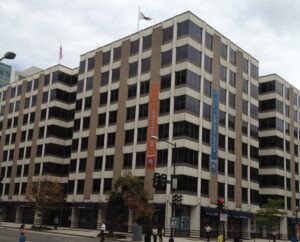Old DC Peace Corps Office now “Elle”
Mayor Muriel E. Bowser (D) joined developer Gary Cohen to cut the ribbon at the Elle, which was formerly home to the U.S. Peace Corps.
Willco launched on the Elle long before the city finalized its Housing in Downtown Program, which offers developers who convert office buildings into housing a 20-year property tax abatement if they meet certain criteria. The $41 million program requires that at least 10 percent of units be affordable for families making below 60 percent of the area’s median income — although some housing advocates pushed for the incentive to include even greater affordability requirements.
But because the Elle was already in progress when those rules went into effect, none of the units are set aside for lower-income residents. The rent can range from $2,100 to $6,000, depending on the unit size, Cohen said.
For all its luxury amenities, from a rooftop terrace to a pet spa, the Elle building has humble beginnings.
Its origin is with Cohen’s grandfather, William Cohen, a middle-school dropout and former trash collector who rose to become a prolific D.C. developer. Starting with a single garbage truck he drove himself, William Cohen soon built one of the largest trash collection services in Washington. But he also was an entrepreneur with an interest in real estate, Gary Cohen said. And after Waste Management bought his trash business, William Cohen purchased a vacant lot at the corner of L and 20th streets NW in 1962, his grandson said.
Office buildings were in demand then, particularly for the government agencies and white-collar industries that expanded around them. But by 2019, when the U.S. Peace Corps’s lease expired, Gary Cohen said the family development company had to rethink the building. It was clear, even before the pandemic, that D.C.’s market was oversaturated with office space. And when the coronavirus hit, he said, it became even clearer that residential was the way to go.
“I thought the location was a no-brainer,” he said of the Golden Triangle district, which stretches from Dupont Circle to Pennsylvania Avenue.
In March, when Bowser visited the Elle for its groundbreaking, Cohen told The Washington Post he was worried about attracting retail to the ground floor amid persistent reports of crime and high-profile companies leaving the city. But on Thursday, with the restaurant inking the lease and 29 percent of the units leased to renters, Cohen sounded optimistic.
“We’re confident other developers will follow suit,” he said. “The next phase of bringing people back to D.C. will require a heavy push from city leaders in the private and public sectors,” he added, saying they need to “give them a reason to come and stay.”
Thomas Danielewski, who works at an architectural firm a block away on K Street, said he moved in Monday. “I have a dream commute,” he said.
The Elle, in some ways, tries to pay homage to the places that came before it. The building has a rooftop bar that will be called the Black Rooster, a throwback to the pub of the same name that opened in 1970 on the ground floor, but shuttered just as the Peace Corps was preparing to move out.
Some of the Rooster’s original bricks line the wall. Until he died in 1973, Cohen said, his grandfather co-owned it, too.

A Former Peace Corps HQ–Washington, DC


Where will PC go?
If the former president wins, PC will be relegated to a broom closet in the West Wing.